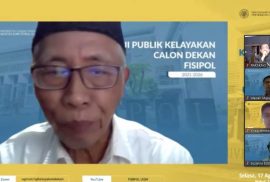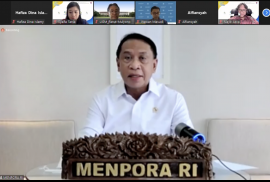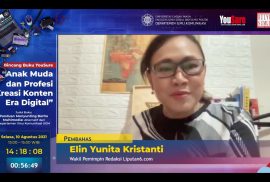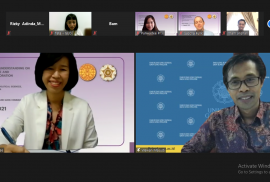Yogyakarta, August 23rd 2021—Governmental Politics Student Corps (Komap) Fisipol UGM held a writing class that is a regular program of the Academic Division. In this sixth writing class, Komap used the topic of “Tips and tricks on making an interesting CV and motivation letter” by inviting two speakers; Arie Ruhyanto as a lecturer of the Governmental Politics Department, and Pratiwi Damayanti as the Director of Rooms in Hyatt Regency Hotel Yogyakarta.To start the session, Arie gave a welcoming remark by stating that the points that need to be paid attention to in CVs and motivation letters are how to make ourselves look interesting to hiring managers or recruiters by stating our experience, expertise, and skills. The plus point that recruiters also want to know is what is our vision and how do we achieve that vision of ours. Dovetailing Arie’s remarks, Pratiwi or better known as Dama explained the basics of cover letters and motivation letters.
Yogyakarta, August 20th 2021─LPPM Sintesa Fisipol UGM held a discussion with the title ‘The Struggle of the Motherland Women’. This event was divided into two sessions, namely the screening of the film “Our Mothers’ Land” and followed by a discussion session with the screenwriter and film producer, Febriana Firdaus. On this occasion, 35 participants participated in the discussion and discussed various experiences of Febriana Firdaus in producing films as well as her experiences in investigative journalism.
Yogyakarta, August 19th 2021─The Master of Public Administration (MAP) of FISIPOL UGM held another public lecture with the title ‘Performance Accountability and Bureaucratic Reform in Indonesia’. This event presents guest lecturer Prof. Dr. Erwan Agus Purwanto, M.Si who currently serves as Deputy for Bureaucratic Reform, Apparatus Accountability, and Supervision of the Ministry of Administrative and Bureaucratic Reform. On this occasion, the event was held online and was attended by 270 participants. In general, the discussion in this event discussed two main interrelated topics: bureaucratic reform and worker accountability. In addition, this event also discussed various programs that can be carried out for efforts to reform the bureaucracy and increase worker accountability.
Yogyakarta, August 17th 2021─In line with Indonesia’s 76th Independence day, the meeting of FISIPOL UGM Senate was held with a special agenda of selecting the 2021-2026 Fisipol dean. This event is a part of a long process of selection of Fisipol UGM dean candidate which ends with a public eligibility test of the dean. In this opportunity, the event was hosted by Dr. Abdul Gaffar Karim who is a lecturer of the governmental politics department and Dr.Fina Itriyati who is a lecturer of the sociology department. Additionally, the event was also attended by representatives of each department, lecturers, students, and Kafisipolgama. The event was held online and attended by 160 people.
The COVID-19 pandemic also became a motivation for the Soprema committee to innovate in their line of events which was forced to adapt with the status quo and therefore was held online. Started with a press conference on Monday (16/8), the Soprema event was then followed by an open registration for the young sociopreneur competition from August 17th until September 17th.
In the press conference attended by the Minister of Youth and Sports, UGM’s Rector, Dean of FISIPOL UGM, Director of YouSure, and the Head of Event of Soprema 2021, Dr. Wawan Mas’udi, S.IP., M.P.A, as the Dean of FISIPOL UGM explained that Soprema is a way for FISIPOL UGM to accommodate young talents all over Indonesia in improving their problem solving skills with a sociopreneurship logic. With that, the young sociopreneur won’t aim for profit only, but also will develop social empathy to solve social problems.
Yogyakarta, August 13th 2021─Through its 49th Digital Series, the Center for Digital Society (CfDS) of FISIPOL UGM held a digital discussion with the title ‘Can Digital Payments Be the Foundation of Indonesia’s Economic Recovery?’ The Digitalk, which was guided by Anisa Pratita, tried to explore the digital payment perspective on Indonesia’s economic conditions from the Regulator’s side, represented by Fathahillah D. Wicaksana, as the Economist of the Payment System Department of Bank Indonesia and from the Industry Players side there is Felix Sharief who is the Head of Government Relations of DANA Indonesia.
Yogyakarta, August 10th 2021─Some time ago, the Youth Studies Center or YouSure and the Department of Communication Science of UGM compiled a book that was the result of collaboration between the regular students who took News Editing classes and IUP class of 2019 students of the Department of Communication Science of UGM. In order to review the book entitled “Guidelines for Editing Multimedia News: Alternatives from the Department of Communication Science of UGM”, YouSure and the Department of Communication Science in collaboration with SKM Bulaksumur UGM held a YouSure Book Talk titled as “Young People and the Digital Age Content Creation Profession”.
Yogyakarta, August 10th 2021─The Institute of Governance and Public Affairs (IGPA) of MAP Universitas Gadjah Mada held a Webinar Policy Forum with the title “Gig Workers in the Midst of the Covid-19 Pandemic: From Work Vulnerabilities to Policy Alternatives”. This event was held online by presenting quite interesting speakers, such as Ahmad Yani as the Director General of Land Transportation of the Ministry of Transportation of the Republic of Indonesia, Prof. Ari Hermawan, and Media Askar Wahyudi as the academics of UGM, and representatives of Gojek drivers @kejo_Ojek. Even though it took place on a holiday, the enthusiasm of the discussion was high enough to be attended by 136 participants. The event, which was moderated by Fery Anggara, succeeded in exploring various dynamics of gig workers, especially online drivers in the midst of the COVID-19 pandemic. In addition, this event is also a joint forum to discuss the future of gig workers who are entitled to justice and legal guarantees in Indonesia.
Yogyakarta, August 5th 2021─The Center for Digital Society together with Huawei Indonesia held the SOBAT CERDIG event (Afternoon with Smart Digital Friends) via Instagram Live. The event took place on Thursday night (5/8) by presenting speaker Rayi Pradono, Huawei ICT Talent Ecosystem Development Manager. The material presented was “AI with a Cause with Huawei” as one of the Advanced Digital Intelligence classes.
Digital intelligence is an individual’s social, emotional and cognitive abilities to face challenges and adapt to the demands of digital life. In the digital era, the existence of computing technology has penetrated a lot in our lives. As a result of technology, there is the term technological disruption, which is an innovation that causes massive changes in the presence of this technology. Especially during the pandemic, almost all sectors are accelerating the transformation to digital.
Dikom and BJM also created a collaboration on several university courses that students can take. Those courses are “Cinema in Southeast Asia” with Budi Irwanto from Dikom and Assist.Prof. Jakrawal Nilthamrong from BJM as the lecturer, as well as “Strategic Planning” by Syaifa Tania and Diah Angendari from Dikom with Sascha Horst Funk from BJM.
The MoU signing was done online and was attended by several lecturers and staff of Dikom, Fisipol UGM as well as those from Faculty of Journalism and Mass Communication Thammasat University.The signing ceremony was done by representatives from both parties, which are Wawan Mas’udi and Assoc.Prof. Kalyakorn Worakullattanee as the dean of Faculty of Journalism and Mass Communication Thammasat University.










